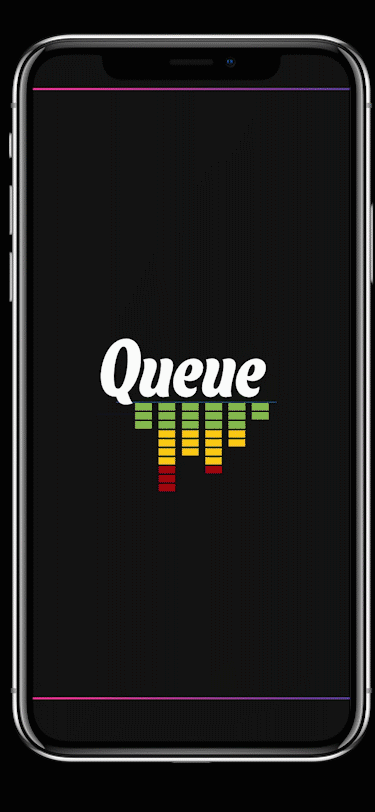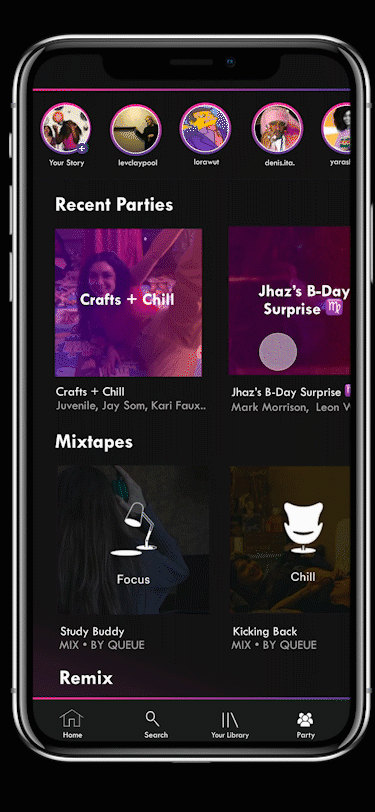RESPONSIBILITIES
Ideation
User Research
Branding
Product Design
Prototyping
TOOLS
Adobe XD
Adobe Premiere
Adobe Illustrator
Adobe Indesign
DURATION
Four Months
Personas developed from user research
LONGTERM GOALS
BACKGROUND
Through my experience acting as a party and DJ, I noticed the common issues that arose when multitasking between both roles. Acting as both "music curator" and "guest pleaser" can create stress on the host and cause them to dismiss their guests. My main intention in building Queue is to find solutions that nurture the relationship between the hosts and partygoers through the music listening experience.
PROBLEM
There are currently no apps that help facilitate the relationship between party hosts and guest. Though Spotify and DJ apps can fulfill some of these functions, they lack features for playlist customization and host-to-guest communication.
OUTCOME
• Social Media Functions
• Host vs Guest Experience
• Music Sorting Needs and Variables
• Creating "FOMO"

UNDERSTANDING THE USER
I first interviewed potential party hosts and guests to understand their individual needs. The relationship between hosts and guest can take many forms. I wanted to know how music affect their event experience, their opinions on a curated playlist, and what common frustrations and situations they faced. DJ's were also interviewed to share their curating music and troubleshooting music issues at parties. Personas were then developed to help identify key users and translate the research collected to individual users.




PRODUCT GOALS
Controllable - to establish a customize algorithmically- based queue to match party's mood
Social - to enable users to create and share content to help preserve memories of the event
Accessible - anyone can access a local queue and submit music to be added
•
•
•
•
•
•
Stress-Free Environment - host can focus on enjoying party and entertaining guest
Build Relationships - guests and host can communicate smoothly and share in common experience
Perfect Queue Curation - create system that can build playlists curated to specific user needs
EARLY DEVELOPMENT
Early designs of the app, prior to user research, focus on the messaging and playlist features. The app organizes playlists in relation to categories, such as bpm, to create event-specific queue. Guest can request music to play on the queue and send messages to the host. The host can either deny the request or accept it. If accepted, the song is added to the queue in a place it best fits.

Early prototype design
BRANDING
While building the product concept the brand's aesthetics and influences were planned, including color palette, typography, icons, and key references.
Younger audiences are the target audience, since they are at prime partygoing and hosting ages. Playful colors are to keep the app fun and streamlined, while a gradient references contemporary design.
Typography
Logo
Display
Body
Aspic Bold
Brand Colors
Brand - Pink
#FB4FA4
Brand - Purple
#654DA7
Background - Purple
#9A42AF
Logo - Green
Logo - Yellow
Logo - Red
Signature pink to purple gradient
FINAL PRODUCT + OUTCOMES
Interviews with potential users informed the design of the following components:
• Social Media Functions
• Host vs Guest Experience
• Music Sorting Needs and Variables
• Creating "FOMO"
STORIES AND SNAPSHOT
Many interviewees expressed "FOMO" or Fear of Missing Out as a reason to attend a party. For them, a good party experience would include photos and videos taken throughout the night. Sharing visual content lets friend know what they are up to, but also provides a snapshot and timeline of what was happening at the event. These personal photos and videos can also create a timeline of the music played and tell the party's story.

Design on iPhone X
•
•
•

Stories Function
Home View
•
•
•
Ability to share party experience through video stories
Ability to see past party's snapshots
Ability to share song name and artist featured in video
•
•
•

Snapshot Function
Queue View
•
•
•
A visual timeline of the event
Ability to see what song or artist was playing when
Track who is posting about event
MUSIC CURATION
Hands down, the biggest frustration in the hosting experience is curating a playlist for the queue. Queue allows users to create a queue based off what the host needs in any given situation. Common issues hosts face are a lack of cohesiveness in a playlist, large shifts in the mood of music, and generally strong playlists muddled by a few random songs. Hosts value the publics perception of their queue, but few have the time to create the perfect mix before the party and manage it during. They need to be able to change the variables of the queue in an effort to avoid the time consuming music sorting process and stay engaged with their guests.
Step 1
Step 2
Step 3

Choose base playlist
Delete songs that don't fit the vibe

Adjust settings of the queue

HOST AND GUEST EXPERIENCE
Hosts and guests have a complicated relationship. At an event, the host's goal is to entertain guests and enjoy their event. Most hosts decide to not take suggestions at a party. Some hosts attribute their lack of interest to due to their guests poor music taste. Generally though, the main reason is that after the first request it becomes a trend . More people start to come to the host about music, from friends to acquaintances to strangers. For many...
This becomes
Can I add a song?
This
Where's your phone?
And, in some situation, even this
What's the password? I'm trying
to add song.
and the cycle repeats...
worst case.
For other hosts, handling user requests is less of problem, it's accepting them. Accepting requests affects the consistency and success of the queue. At a party with diverse types guests music tastes don’t always align. The more songs guests freely add to the queue, the less control the host can have on the music quality. Queue helps party hosts create a consistent listening experience while avoiding
Host are open to requests but want to minimize music request- related interactions and avoid the pressure of screening songs.
It's common for partygoers to not have a strong relationship with the party host. Some may not know the host at all. Many partygoers revealed they avoid recommending music at parties where they don't know they host to not appear rude or annoying. However, if given the opportunity to add music to the queue, they would. Queue gives these party goers the chance to requests songs without confronting the host.
Guests need an outlet to suggest music and communicate with the hosts in a low-stakes environment.
Queue allows guest to join nearby parties and connect to their queues. They are able to see what songs are coming up next and have access to both messages and snapshot features. Unlike the host view, guests can not change the order of the music or delete songs.
Guest POV

Guest POV
MESSAGING
Queue makes communication between hosts and guests simple. Guests can only send messages to host in the form of a music request. They can choose from saved or previously requested songs, or search through a database.

Guest View

Host View
Host can accept or deny individual requests, or deny all at once. Host can also filter out songs through settings. If a request is accepted, it is added to the queue where it best fits. The queue automatically adjusts to avoid jarring transitions. The guest is then notified their song has been added and given an estimated playing time to help communicate the status of their requests.
